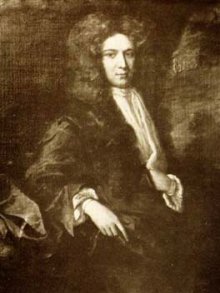Anthony Collins
| Anthony Collins | |
|---|---|
 |
|
| Born |
21 June 1676 Heston, near Hounslow, Middlesex, England |
| Died | 13 December 1729 (aged 53) London, England |
| Nationality | English |
| Spouse(s) |
|
| Era | Modern philosophy |
| Region | Western Philosophy |
|
Main interests
|
History, theology |
|
Influences
|
|
Anthony Collins (21 June 1676 O.S. – 13 December 1729 O.S.), was an English philosopher, and a proponent of deism.
Collins was born in Heston, near Hounslow in Middlesex, England. He was educated at Eton College and King's College, Cambridge, and studied law at the Middle Temple. The most interesting episode of his life was his intimacy with John Locke, who in his letters speaks of him with affection and admiration. In 1715 he settled in Essex, where he held the offices of justice of the peace and deputy-lieutenant, which he had previously held in Middlesex. He died at his house in Harley Street, London.
His writings gather together the results of previous English freethinkers. The imperturbable courtesy of his style is in striking contrast to the violence of his opponents; and, in spite of his unorthodoxy, he was not an atheist or even an agnostic. In his own words, "Ignorance is the foundation of atheism, and freethinking the cure of it" (Discourse of Freethinking, 105).
His first notable work was his Essay concerning the Use of Reason in Propositions the Evidence whereof depends on Human Testimony (1707), in which he rejected the distinction between "above reason" and "contrary to reason", and demanded that revelation should conform to man's natural ideas of God. Like all his works, it was published anonymously, although the identity of the author was never long concealed.
Six years later appeared his chief work, A Discourse of Freethinking, occasioned by the Rise and Growth of a Sect called Freethinkers (1713). Notwithstanding the ambiguity of its title, and the fact that it attacks the priests of all churches without moderation, it contends for the most part, at least explicitly, for no more than must be admitted by every Protestant. Freethinking is a right which cannot and must not be limited, for it is the only means of attaining a knowledge of truth, it essentially contributes to the well-being of society, and is not only permitted but enjoined by the Bible. In fact the first introduction of Christianity and the success of all missionary enterprise involve freethinking (in its etymological sense) on the part of those converted.
...
Wikipedia
